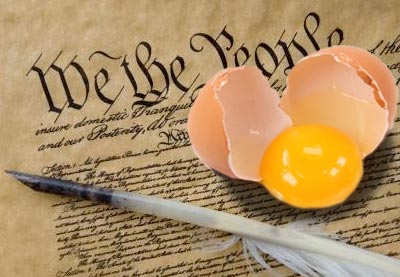Will Congress Take a Bite out of Years of HSUS Activism?

Wayne Pacelle, CEO of the Humane Society of the U.S., got a couple of surprises last week. For starters, we released a new report on HSUS’s deceptive fundraising and sent a copy to 12 state Attorneys General with requests for investigations. (It has since gone to 13 more.) And the night before, as Pacelle sat watching Congress debate the Farm Bill, Rep. Steve King (R-IA) successfully added an amendment that would dampen many HSUS lobbying gains of the past decade.
The amendment (found here), known as the Protecting Interstate Commerce Act, reads: “The government of a state or locality therein shall not impose a standard or condition on the production or manufacture of any agricultural product sold or offered for sale in interstate commerce” if the production 1) occurs in another state and 2) the standards and conditions imposed on the out-of-state producer are greater than is required by the federal government or by the producer’s home state.
What this means for HSUS and California is that AB 1437—a state law with questionable constitutionality—would no longer be valid. AB 1437 takes California’s Proposition 2 requirement for larger cages for egg-laying hens and imposes those same regulations on egg producers in Iowa and other states if they want to sell in the Golden State. If King’s amendment becomes law, that restriction would be no more.
This leaves HSUS with two options. First, it can continue to lobby on farm animal issues at the federal level—which it is already doing with its lobbying on the Hill for an egg bill. Its second option is to use its most effective formula for passing animal-rights law: the emotionally manipulative ballot campaign–but only on a state-by-state basis. When HSUS runs a a ballot initiative it spends millions of dollars to produce propaganda, casting nuances and animal welfare science aside for cheap demagoguery. That’s how a lot of political elections are run these days, and it doesn’t help the country much. But it’s easy for HSUS to message the same thing ad nauseum with a few select sound-bites.
Pacelle, of course, knows this and is making the King amendment seem like it would practically be the end of civilization, alleging that it would get rid of environmental, public health, and labor laws, too.
We know Pacelle isn’t a constitutional attorney (and neither are any of us), but his response to King’s amendment is outrageously uninformed. On his blog, he claims that the amendment would ban Prop 2 and other so-called animal protection laws in other states. According to the Los Angeles Times, Pacelle even said that King’s amendment “could prevent states from enacting laws that would, for example, prevent the sale of food produced by forced labor.” Uh, last we checked, Wayne, the Thirteenth Amendment is still on the books.
Pacelle told the San Francisco Chronicle that King's amendment eliminates all state standards. The King amendment does nothing of the sort. California is free to pass laws based on questionable science and emotional appeals, so long as they only restrict California’s own farmers. So Prop 2, as flawed is it may be, will apparently still stand.
And the restriction on California farmers invokes the constitutional quandary that surrounds AB 1437 in the first place. Rep. Dennis Cardoza (D-CA) said it was “an awful mistake” for Californians to have approved Prop 2 and that the restrictions make it difficult for California egg farmers to compete with out of state producers who are not subject to the same, costly restrictions. One egg farmer in California said that if AB 1437 is invalidated, “I'm dead. And all the egg producers are in California, too.” According to the Los Angeles Times, Rep. Cardoza said that if “you can put small cages in Nevada, right across the border and our state can't prohibit it, then that's a problem for us.”So California wants to tell Nevada what to do, which is unconstitutional. Exactly our point—and Rep. King’s.
If the purpose of passing AB 1437 was to protect California egg farmers from being undercut by out-of-state sellers, then the law would be unconstitutional. The constitutional issue is the “dormant” Commerce Clause which helps to restrict protectionist policies by the states.
California has been stifled on a similar economic restriction before. A federal judge blocked California’s low-carbon fuel standards from taking effect in January because the law unconstitutionally regulates the activities of out-of-state producers.
States can claim to be protecting the health and safety of their citizens and pass some economic restrictions. A Supreme Court decision in 1960 allowed Detroit to impose greater smoke pollution restrictions on ships that come into port for the sake of the health and safety of residents. But claiming safety is not a catch-all that allows other state economic restrictions. Courts will also consider if the safety concerns are valid. Iowa’s restrictions on the length of tractor trailers, were said to have produced only an “illusory” safety interest. That’s why the text of AB 1437 is built around food safety concerns. But that claim is highly questionable, as we’ve already discussed.
Regardless of the success of King’s amendment, California’s laws on hens are probably unconstitutional. And that will be bad news for the California egg producers who are stuck with them no matter what.
The Farm Bill has a lot of complex politics involved, but as the King amendment moves forward we will keep you posted on the details.



